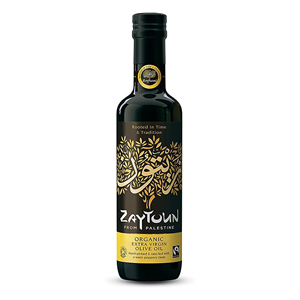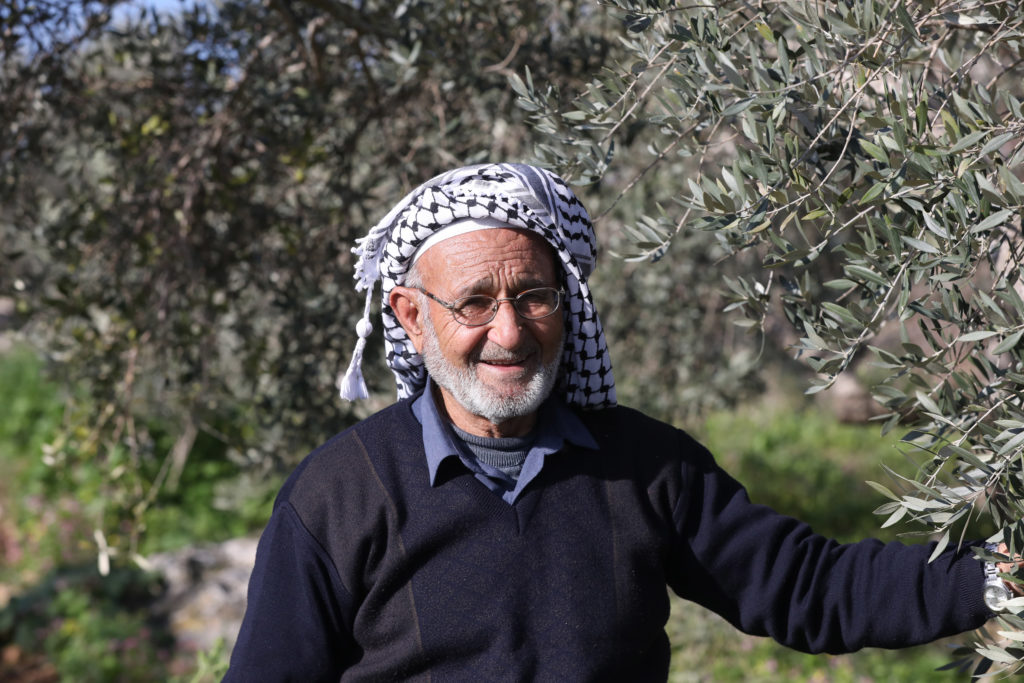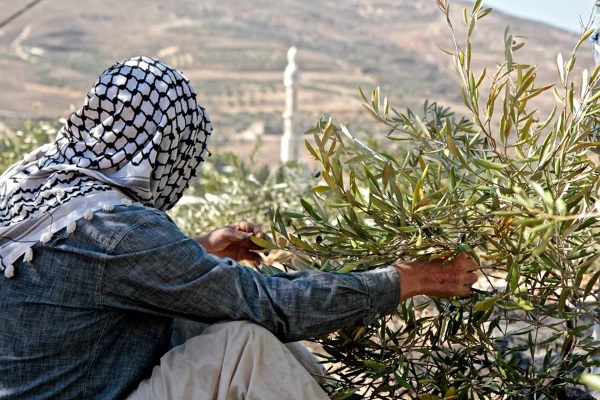From dips and drizzles to shampoos and skincare, olive oil is a firm favourite on our shelves and a health-food hero. Here, we explain why it’s also a vital source of income for Fairtrade farmers operating in challenging contexts such as the West Bank.
Olive oil has long been celebrated for its many health benefits, particularly when it comes to keeping our hearts in good shape. However, new research has now revealed that this nutrient-rich oil could protect us from a wider range of life-threatening conditions than previously thought.
Published by Harvard University researchers in January, the study suggests that people who consume more than half a tablespoon of olive oil daily could lower their risk of dying by around a fifth, compared to people who hardly ever, or never, eat it. The research also indicates that people whose diets included the highest amounts of olive oil were less likely to succumb to conditions such as cardiovascular disease and cancer.
These new findings come at a time when many of us continue to pursue healthier lifestyles as part of our 2022 new year resolutions. It’s no surprise, then, that olive oil remains a popular choice in households.
In the UK, imports of olive oil were valued at approximately £190 million in 2020. Overall, Europe is the world’s largest importer of the product, accounting for more than a half of total global imports. Meanwhile, sales of olive oil across the continent are predicted to rise in the next five years, as demand for this healthy fat continues.
Despite its growing popularity, many fans of olive oil may be unaware of the challenges facing those who produce it, including Fairtrade farmers in the occupied West Bank (see below). This makes it all the more important that consumers and companies choose Fairtrade olive oil where they can, to help farmers get the best deal possible.
The many benefits of Fairtrade olive oil
Fairtrade virgin and extra-virgin oil – both regular and organic – was first introduced in 2008. Certified producer groups behind Fairtrade olive oil can be found in Morocco, Argentina and the West Bank, sold by UK brands and retailers such as Zaytoun and Equal Exchange.
Thanks to its menu of vitamins and antioxidants, olive oil is more than just a culinary catch – it’s also a popular ingredient in haircare, skincare and cosmetic brands. As the beauty industry increasingly looks to embrace responsibly sourced ingredients, ranges that feature Fairtrade ingredients, including olive oil, are setting the standard.
Fairtrade cosmetic brands carry the Fairtrade Sourced Ingredient (FSI) label – used when a product is made up of multiple ingredients, and 100% of one ingredient (occasionally more) is purchased as Fairtrade. The beauty of the FSI certification model is that it gives brands the flexibility of incorporating ingredients such as Fairtrade olive oil in their cosmetic products.
All this is good news for olive farmers working in contexts such as the West Bank. With Fairtrade, they can earn a higher price for their produce, enjoy decent working conditions and rely on the security of stable, long-term contracts.
Partnering with Palestinian growers under pressure
For Palestinians, cultivating olive trees is considered a fundamental aspect of cultural and economic life. In the occupied West Bank, nearly half of cultivated Palestinian agricultural land is planted with millions of olive trees: these support the livelihoods of as many as 100,000 families, according to the UN’s Food and Agriculture Organization.

Palestinian farmers tend their olive groves in difficult circumstances. They work in the challenging context of Israeli occupation, economic hardship, and ongoing insecurity and conflict: this includes violence from settlers, often during harvesting season. Amid this backdrop, Fairtrade certification offers hope to olive growers.
In 2009 Zaytoun Extra Virgin Olive Oil, grown by Palestinian farmers, was the world’s first olive oil to be awarded Fairtrade certification. The olives are grown by family farmers whose Palestinian ancestors have tended their trees by hand for generations. They remain a firm favourite with UK shoppers: Zaytoun’s olive oil was voted the nation’s favourite organic product in the Soil Association’s 2021 BOOM (Best of Organic Market) Awards.
The farmers behind the oil belong to the Al-Muqadasa Fair Trade Producers’ Company, made up of nearly 700 farmers. The company is part of the Palestinian Fair Trade Association (PFTA), who also supply their oil to ethical retailers like Equal Exchange.
For olive growing co-operatives in the West Bank, partnering with Fairtrade has helped bring some stability and better incomes in uncertain times, connecting growers with export markets and making olive farming more viable.
And as the impact of climate change grows, the assurance of a fair price for their produce means olive farmers can access the additional resources needed to mitigate damage to their crops caused by wind, hot temperatures and drought. Certified co-operatives within the PFTA also share knowledge and experience, which helps them to stay resilient in the face of climate change and other challenges.
Palestinian farmer Haj Rafeeq Hussein grows 900 rain-fed olive and almond trees in Ti’innik, north of the West Bank. Thanks to the support that Fairtrade certification brings, he has been able to hire additional workers to carry out regenerative farming practices such as mulching and feeding the trees with organic manure, to keep more moisture in the soil.

In a message to shoppers, he says:
We cultivate our crops in hard conditions and we insist on producing high-quality products. We welcome your support, so that we can continue farming.
Haj Rafeeq Hussein
A world of difference
Fairtrade olive oil co-operatives can get access to extra funds from the Fairtrade Premium – an additional payment to spend on business or community initiatives of their choice. This makes a world of difference. For instance, some olive farmers use their Premium funds to invest in processing facilities, enabling them to capture a greater share of the revenues from their harvests.
At Fairtrade Foundation we hope more business join us in partnering with farmers like Haj Rafeeq Hussein, who remain committed to growing delicious olives against all odds. We particularly look forward to even more cosmetic brands launching Fairtrade olive oil in a range of products in the future.
Ultimately, whether it’s for culinary or cosmetic purposes, companies who source sustainable Fairtrade olive oil can join us in helping to ensure this versatile product continues to bring life – not just to those who use it, but also to those who grow it.
For more information about Fairtrade olive oil or the FSI certification scheme, email: commercial@fairtrade.org.uk
Image: Fairtrade olive farmer Haj Rafeeq Hussein. Credit: Zaytoun
